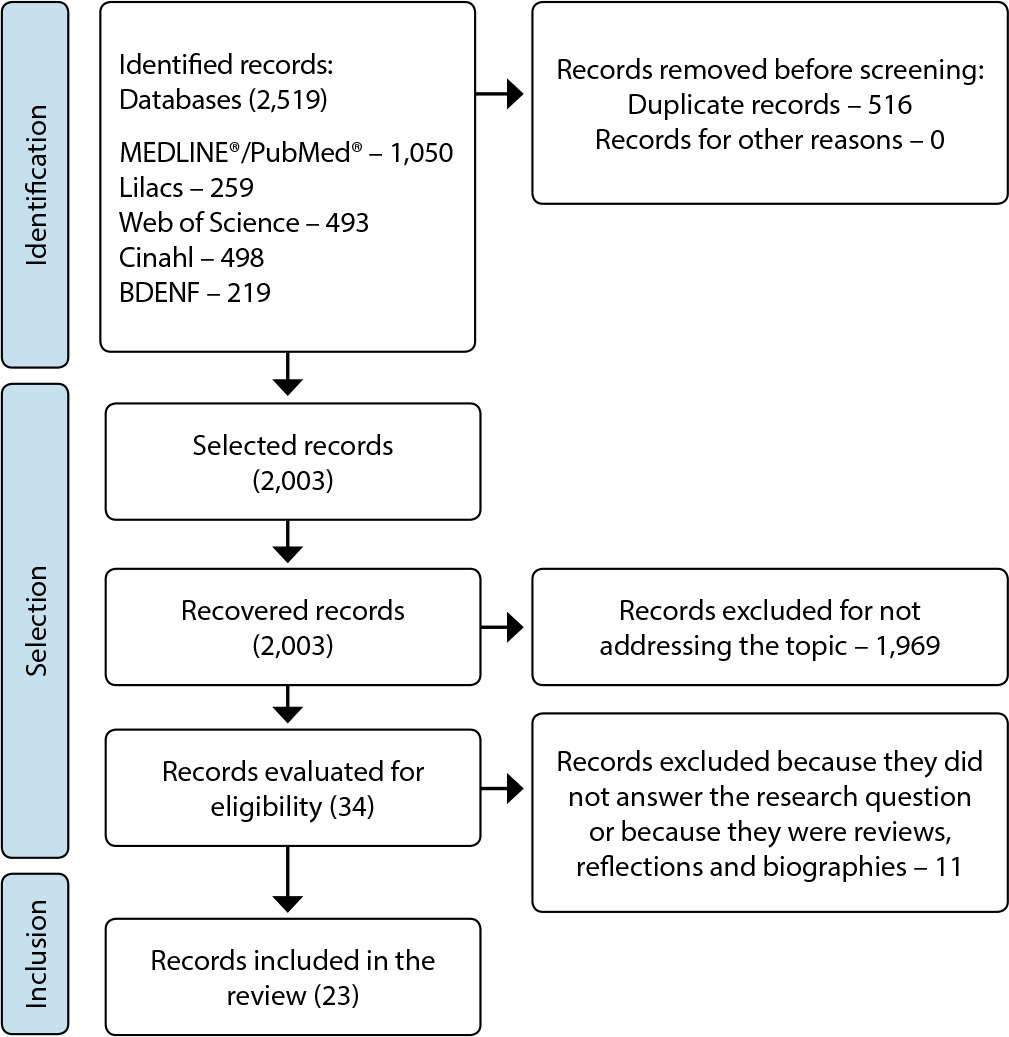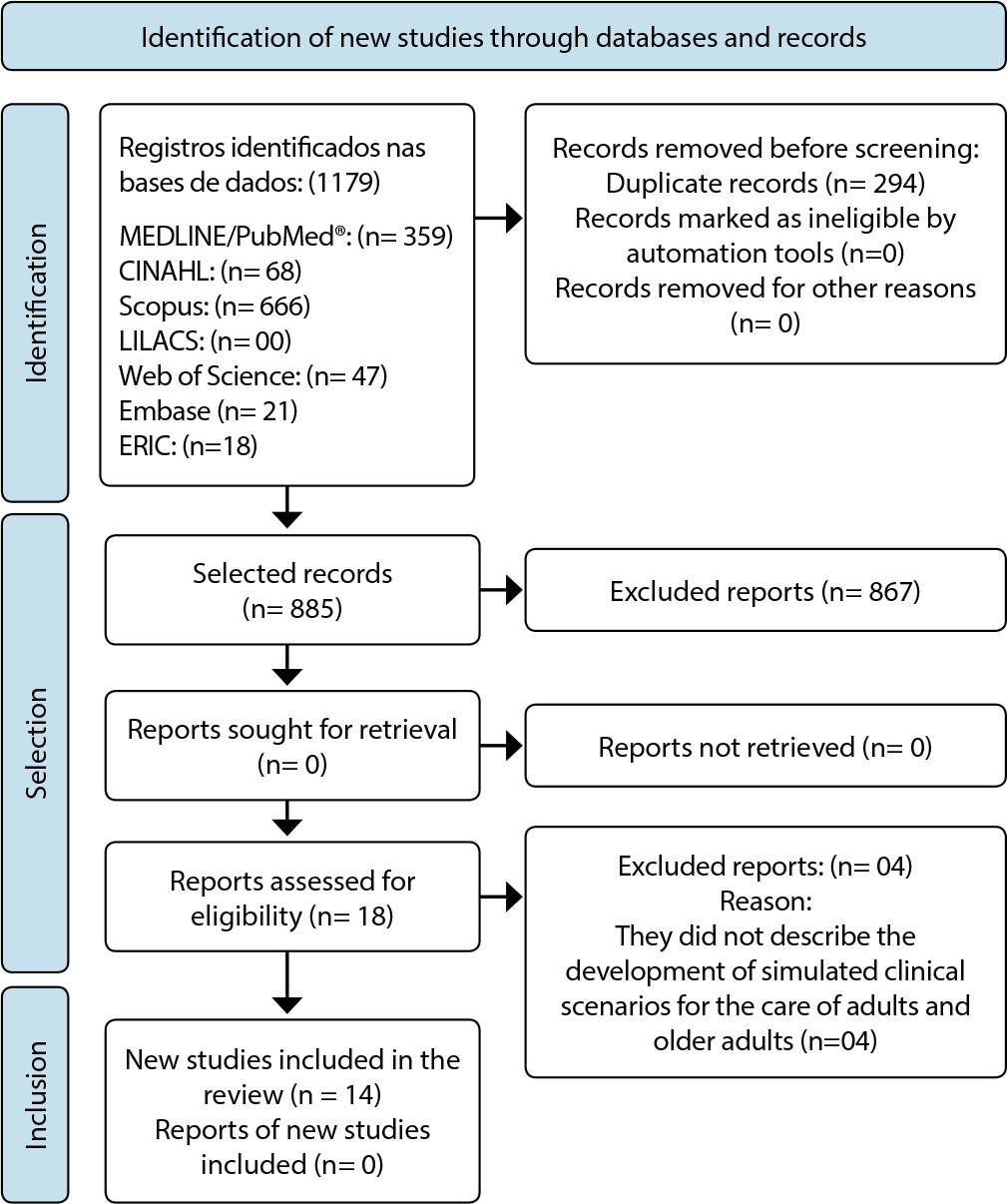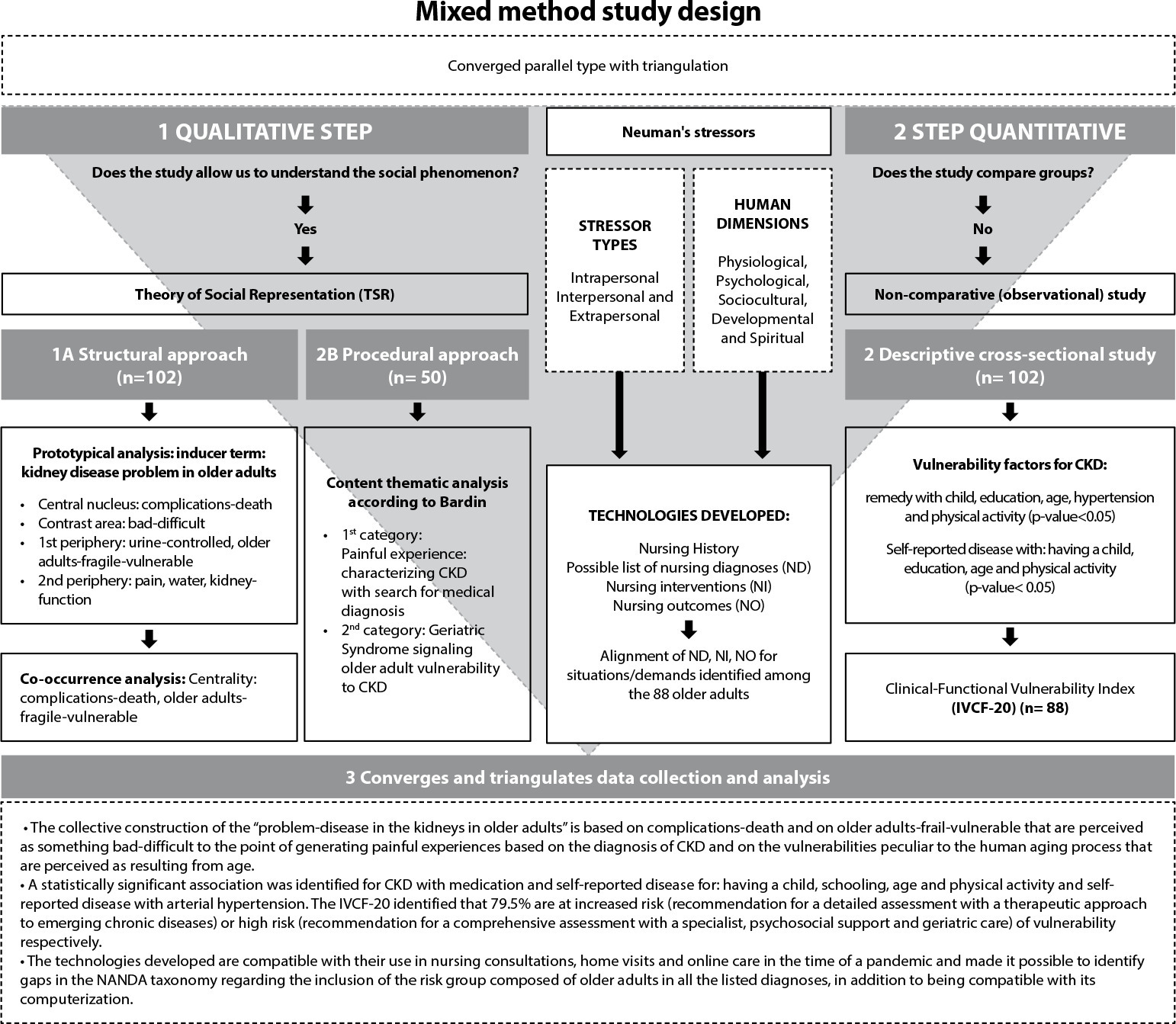-
ORIGINAL ARTICLE
Brazilian undergraduate nursing students’ critical thinking need to be increased: a cross-sectional study
Revista Brasileira de Enfermagem. 2023;76(1):e20220315
11-28-2023
Abstract
ORIGINAL ARTICLEBrazilian undergraduate nursing students’ critical thinking need to be increased: a cross-sectional study
Revista Brasileira de Enfermagem. 2023;76(1):e20220315
11-28-2023DOI 10.1590/0034-7167-2022-0315
Views0See moreABSTRACT
Objectives:
to map Brazilian undergraduate nursing students’ critical thinking level and investigate the correlation between selected sociodemographic data and critical thinking domains.
Methods:
in this descriptive cross-sectional study, participants’ (N=89) critical thinking was assessed using the Health Science Reasoning Test. Correlation between critical thinking domains and sociodemographic data was assessed using the Pearson correlation coefficient.
Results:
the overall results showed a moderate level of participants’ critical thinking (mean = 70.7; standard deviation 5.7). A poor performance was identified in 5 of the 8 critical thinking domains. A significant positive correlation was found between education period and critical thinking (p<.001).
Conclusions:
poor level in students critical thinking domains may lead to negative consequences for their learning outcomes. Further studies should be carried out to confirm our results, in addition to investigation of teaching methods that encourage and ensure the development of students’ critical thinking skills during nursing education.
-
REVIEW
Contributions of the institutions for the nursing professionalization: integrative review (2010-2020) in the light of freidsonian conceptions
Revista Brasileira de Enfermagem. 2023;76(1):e20220153
11-28-2023
Abstract
REVIEWContributions of the institutions for the nursing professionalization: integrative review (2010-2020) in the light of freidsonian conceptions
Revista Brasileira de Enfermagem. 2023;76(1):e20220153
11-28-2023DOI 10.1590/0034-7167-2022-0153
Views0See moreABSTRACT
Objective:
To analyze the contributions of the Brazilian Nursing Association and the Federal and Regional Nursing Councils in the literature for the professionalization of nursing in the light of Eliot Freidson’s theoretical conceptions.
Methods:
Integrative review of the literature, of socio-professional historical interest, carried out from June to November 2021, through the question: How did professional associations contribute to the professionalization of Brazilian nursing according to the literature from 2010 to 2020? The evidence were organized in a synoptic table, which allowed the construction of a conceptual map.
Results:
In the 23 selected studies, the professional associations presented scientific, social and political contributions, which shape the professional field of nursing, enabling knowledge/expertise, autonomy and self-regulation.
Final considerations:
The efforts of these institutions reaffirm nursing as an academic and consulting profession, capable of exerting control over the essence of nursing work. They strive to consolidate nursing as a legitimate professional field of health in Brazil.

-
EDITORIAL
The diagnosis and treatment of latent tuberculosis by nurses in Brazil: a necessary strategy
Revista Brasileira de Enfermagem. 2023;76(1):e760101
11-28-2023
Abstract
EDITORIALThe diagnosis and treatment of latent tuberculosis by nurses in Brazil: a necessary strategy
Revista Brasileira de Enfermagem. 2023;76(1):e760101
11-28-2023DOI 10.1590/0034-7167.2023760101
Views0Tuberculosis (TB) prevention, from preventing the progression of infection to active TB, is the main strategy to reduce its incidence and to reach the goals defined by the World Health Organization, according to the End TB strategy().Brazil, ranking 19th in terms of the number of cases, assumed its commitment to institute preventive treatment, especially among […]See more -
REVIEW
Simulated scenarios in nursing: an integrative literature review
Revista Brasileira de Enfermagem. 2023;76(1):e20220123
11-28-2023
Abstract
REVIEWSimulated scenarios in nursing: an integrative literature review
Revista Brasileira de Enfermagem. 2023;76(1):e20220123
11-28-2023DOI 10.1590/0034-7167-2022-0123
Views0See moreABSTRACT
Objectives:
to identify in scientific literature which simulated clinical scenarios were developed and validated for teaching and learning in nursing.
Methods:
integrative review, carried out in seven sources of information. The Rayyan program was used for selection, content analysis to explore the findings and the methodological assessment tool of the validity process, entitled Quality Appraisal tool for Validity Studies.
Results:
initially, 1,179 manuscripts were identified and 14 were part of the sample. Two categories were defined: Profile of simulated clinical scenarios produced in nursing; and Clinical skills developed and their assessment mechanisms.
Final Considerations:
there was a preponderance of high-fidelity scenarios, built in Brazil in the last five years, aimed at nursing students on the themes of emergency, maternal care and stomatherapy, addressing the assessment of cognitive, psychomotor and affective skills in nursing. Most studies obtained good methodological quality in their content validity process.

-
ORIGINAL ARTICLE
Factors associated with psychopathological symptoms among nurses at a university hospital
Revista Brasileira de Enfermagem. 2023;76(1):e20220075
11-28-2023
Abstract
ORIGINAL ARTICLEFactors associated with psychopathological symptoms among nurses at a university hospital
Revista Brasileira de Enfermagem. 2023;76(1):e20220075
11-28-2023DOI 10.1590/0034-7167-2022-0075
Views0See moreABSTRACT
Objectives:
to analyze the factors associated with psychopathological symptoms among nurses at a university hospital.
Methods:
a cross-sectional study developed at a university hospital in Pernambuco, in which 90 nurses participated. A questionnaire with social and professional characteristics and the Symptom Assessment Scale were used.
Results:
an association was found between the variable changing profession and the presence of characteristic symptoms of psychoticism, somatization and anxiety among nurses.
Conclusions:
the emergence of psychopathological symptoms has influenced nurses’ desire to search for another profession. This evidence reinforces the need for greater investments in better working conditions and welcoming actions in the work environment, in order to provide a better quality of professional life and promote the health of these workers.
-
ORIGINAL ARTICLE
O pensamento crítico dos estudantes de graduação em enfermagem brasileiros precisa ser ampliado: estudo transversal
Revista Brasileira de Enfermagem. 2023;76(1):e20220315
11-28-2023
Abstract
ORIGINAL ARTICLEO pensamento crítico dos estudantes de graduação em enfermagem brasileiros precisa ser ampliado: estudo transversal
Revista Brasileira de Enfermagem. 2023;76(1):e20220315
11-28-2023DOI 10.1590/0034-7167-2022-0315
Views0RESUMEN
Objetivos:
mapear el nivel de pensamiento crítico de los estudiantes brasileños de pregrado en enfermería e investigar la correlación entre los datos sociodemográficos seleccionados y los dominios del pensamiento crítico.
Métodos:
en este estudio transversal descriptivo, el pensamiento crítico de los participantes (N=89) fue evaluada mediante el Health Science Reasoning Test. La correlación entre los dominios de pensamiento crítico y los datos sociodemográficos se evaluó mediante el coeficiente de correlación de Pearson.
Resultados:
los resultados generales mostraron un nivel moderado de pensamiento crítico de los participantes (media=70,7; desviación estándar 5,7). Se identificó un desempeño deficiente en 5 de los 8 dominios del pensamiento crítico. Se encontró una correlación positiva significativa entre educación y pensamiento crítico (p<0,001).
Conclusiones:
los bajos niveles de los dominios del pensamiento crítico en los estudiantes pueden tener consecuencias negativas para sus resultados de aprendizaje. Se deben realizar más estudios para confirmar nuestros resultados, además de la investigación de métodos de enseñanza que fomenten y aseguren el desarrollo de habilidades de pensamiento crítico de los estudiantes durante su formación en enfermería.
Keywords:Educação em EnfermagemEstudantes de EnfermagemEstudos TransversaisPensamento CríticoServiços de SaúdeSee more -
ORIGINAL ARTICLE
Nursing protocol in chronic kidney disease prevention in older adults in primary care
Revista Brasileira de Enfermagem. 2023;76(1):e20220052
11-28-2023
Abstract
ORIGINAL ARTICLENursing protocol in chronic kidney disease prevention in older adults in primary care
Revista Brasileira de Enfermagem. 2023;76(1):e20220052
11-28-2023DOI 10.1590/0034-7167-2022-0052
Views0See moreASBTRACT
Objectives:
to develop a protocol for Nursing Process operationalization in approaching older adults with vulnerability to chronic kidney disease in Primary Health Care, based on Neuman’s stressors.
Methods:
a methodological study, carried out in two stages: 1) synthesis of evidence using an inductive strategy (mixed method study) and 2) protocol development to support the nursing process operationalization with older adults enrolled in a Basic Health Unit, using a deductive strategy (Neuman’s stressor concepts, NANDA, NIC, and NOC taxonomies, Risner’s line of reasoning, and cross-mapping), described according to A Step-by-Step Guide to Developing Protocols.
Results:
102 older adults participated, and 17 diagnoses, 34 interventions and 26 nursing outcomes were identified.
Conclusions:
the protocol developed is a technology that makes it possible to operationalize the Nursing Process, based on Neuman’s stressors and on taxonomy, conceptual and care frameworks, guiding care and nursing records.

-
ORIGINAL ARTICLE
Handgrip strength in older adults and driving aptitude
Revista Brasileira de Enfermagem. 2023;76(1):e20210729
11-28-2023
Abstract
ORIGINAL ARTICLEHandgrip strength in older adults and driving aptitude
Revista Brasileira de Enfermagem. 2023;76(1):e20210729
11-28-2023DOI 10.1590/0034-7167-2021-0729
Views0See moreABSTRACT
Objective:
to analyze handgrip strength as a predictor of the inability to drive in older adults.
Method:
a cross-sectional study conducted in traffic clinics with 421 older adults in Curitiba-Paraná from January 2015 to December 2018. A sociodemographic and clinical questionnaire, handgrip strength test, and queries from the National Registry of Qualified Drivers form were applied.
Results:
Reduced handgrip strength was not a predictor of inaptitude for vehicular driving (p=0.649). The predictors of inaptitude were: low education (p=0.011), incomplete elementary education (p=0.027), and cognition (p=0.020).
Conclusion:
reduced handgrip strength was not shown to predict for loss of driving skills in older adults. Low education level and reduced cognition level are conditions that were shown to be predictors for loss of vehicular driving license.
-
ORIGINAL ARTICLE
Mental health profile of the elderly community: a cross-sectional study
Revista Brasileira de Enfermagem. 2020;73(1):e20180191
02-10-2020
Abstract
ORIGINAL ARTICLEMental health profile of the elderly community: a cross-sectional study
Revista Brasileira de Enfermagem. 2020;73(1):e20180191
02-10-2020DOI 10.1590/0034-7167-2018-0191
Views0See moreABSTRACT
Objective:
to describe the mental health profile of the elderly registered in a Family Health Unit in the city of Recife, Pernambuco State.
Method:
it was a descriptive quantitative study, conducted with 159 elderly through the scales Geriatric Depression, Resilience, Social Support, Life Satisfaction, and Positive and Negative Affects, Mini-Mental State Examination, Stressful Events Inventory and Brazil Old Age Shedule.
Results:
females, young and literate elderly predominated. Most were satisfied with life, 52.2% without depressive symptoms, 68.6% without cognitive impairment, 67.9% high resilience and 95.8% high social support, but 62% of elderly with depressive symptoms showed cognitive deficit. Negative correlation was identified between depression and cognitive impairment, resilience, social support and life satisfaction.
Conclusion:
assessment of these indicators identifies triggers of psychological distress, assisting the nursing staff in the development of preventive and care actions.
-
ORIGINAL ARTICLE
Factors associated with depressive symptoms in elderly caregivers with chronic pain
Revista Brasileira de Enfermagem. 2020;73(1):e20170782
01-27-2020
Abstract
ORIGINAL ARTICLEFactors associated with depressive symptoms in elderly caregivers with chronic pain
Revista Brasileira de Enfermagem. 2020;73(1):e20170782
01-27-2020DOI 10.1590/0034-7167-2017-0782
Views0See moreABSTRACT
Objective:
to identify factors associated with depressive symptoms in elderly caregivers with chronic pain.
Method:
the study included people 60 years of age or older who reported chronic pain and cared for another elderly person living in the same household (n=186). Statistical analyzes were performed using the Mann-Whitney test, univariate and multiple logistic regression.
Results:
most participants had no depressive symptoms (70.4%), 24.2% had mild depressive symptoms and 5.4% had severe symptoms. Univariate analysis showed that the variables family income, number of diseases, number of medications in use, pain intensity, overload and perceived stress were associated with depressive symptoms. Multivariate analysis found an association with perceived stress (95% CI 1.101-1207) and number of medications (95% CI 1.139-1.540) in use.
Conclusion:
factors associated with depressive symptoms in elderly caregivers with chronic pain were stress and the number of medications in use.
-
EXPERIENCE REPORT
Collaborative practices from health care teams to face the covid-19 pandemic
Revista Brasileira de Enfermagem. 2020;73:e20200470
10-26-2020
Abstract
EXPERIENCE REPORTCollaborative practices from health care teams to face the covid-19 pandemic
Revista Brasileira de Enfermagem. 2020;73:e20200470
10-26-2020DOI 10.1590/0034-7167-2020-0470
Views0See moreABSTRACT
Objective:
To report the experience of collaborative practices facing the COVID-19 pandemic.
Methods:
This is a report about the experience of collaborative practices conducted by health care teams in emergency service in the Emergency Care Units facing of COVID-19 pandemic in the city of Fortaleza, State of Ceará, in the first semester of 2020.
Results:
Collaborative actions, cooperation and effective communication among nursing and medical team contribute to the management of mild and complex cases of COVID-19, as well as qualify them in suitable and necessary care and confrontation measures.
Final considerations:
The report shows the need for collaborative practices to minimize negative effects on the population in the face of the new coronavirus pandemic.

-
ORIGINAL ARTICLE
Spirituality and religiousity in the experience of suffering, guilt, and death of the elderly with cancer
Revista Brasileira de Enfermagem. 2020;73:e20190034
07-08-2020
Abstract
ORIGINAL ARTICLESpirituality and religiousity in the experience of suffering, guilt, and death of the elderly with cancer
Revista Brasileira de Enfermagem. 2020;73:e20190034
07-08-2020DOI 10.1590/0034-7167-2019-0034
Views0See moreABSTRACT
Objective:
to understand spirituality and religiosity in the experience of suffering, guilt, and death of the elderly with cancer.
Method:
qualitative research based on Viktor Frankl’s Existential Analysis. Twenty phenomenological interviews were conducted with people over 60 years old undergoing chemotherapy treatment at an oncology unit of a hospital in the city of Salvador, Bahia State, Brazil, between August and October 2018.
Results:
the following categories emerged: Experiences spirituality and religiosity in the face of the tragic triad and existential emptiness; Uses spirituality/religiosity as resilience strategies. After apprehension of ontic aspects, it was possible the ontological understanding of spirituality and religiosity in the face of suffering, guilt, and death experienced in the elderly with cancer’s daily life.
Final considerations:
spirituality and religiosity were understood as coping strategies used in the unstable experience of the elderly with cancer, providing comfort and resilience.
-
ORIGINAL ARTICLE
Quality of life of institutionalized aged with and without symptoms of depression
Revista Brasileira de Enfermagem. 2019;72:127-133
12-05-2019
Abstract
ORIGINAL ARTICLEQuality of life of institutionalized aged with and without symptoms of depression
Revista Brasileira de Enfermagem. 2019;72:127-133
12-05-2019DOI 10.1590/0034-7167-2018-0316
Views0See moreABSTRACT
Objective:
compare the quality of life (QOL) of aged residents in homes for aged people with or without symptoms of depression, and identify social, physical activity; leisure; health and basic activities of daily living (ADL) variables that correlate with QOL scores.
Method:
cross-sectional study conducted with 101 institutionalized aged. Multiple linear regression was used for data analysis.
Results:
symptoms of depression changed negatively the QOL in the domains: autonomy; present, past and future activities; social participation; intimacy and total score. Dependent aged presented lower QOL for the performance of ADL in the domains: autonomy; social participation and total score; dancing without limitation of movement; liking the residential and not presenting symptoms of depression were the variables that positively influenced the QOL of the aged.
Conclusion:
social and psychological support, good living conditions and stimulating assistance can improve the QOL of institutionalized elderlies.
-
EDITORIAL
Reality and challenges of ageing
Revista Brasileira de Enfermagem. 2019;72:1-2
12-05-2019
Abstract
EDITORIALReality and challenges of ageing
Revista Brasileira de Enfermagem. 2019;72:1-2
12-05-2019DOI 10.1590/0034-7167.2019-72suppl201
Views0The global population ageing has aroused growing interest, a search for an understanding of the situational consequences and possible adjustments that society will have to make. According to the Brazilian Institute of Geography and Statistics (IBGE – Instituto Brasileiro de Geografia e Estatística), in 2025, the country will place the 6th position in the world […]See more -
ORIGINAL ARTICLE
Transformational leadership in nursing practice: challenges and strategies
Revista Brasileira de Enfermagem. 2020;73(6):e20190364
08-10-2020
Abstract
ORIGINAL ARTICLETransformational leadership in nursing practice: challenges and strategies
Revista Brasileira de Enfermagem. 2020;73(6):e20190364
08-10-2020DOI 10.1590/0034-7167-2019-0364
Views0INTRODUCTIONLeadership stands out as one of the managerial skills necessary to nurses’ practice, especially in the current scenario of frequent overcrowding and scarcity of beds, material resource deficits and insufficient staffing. The reality of some public health services has weaknesses in serving the population and lacks nurses with the knowledge, skills and attitudes to act […]See more -
ORIGINAL ARTICLE
Stress and quality of sleep in undergraduate nursing students
Revista Brasileira de Enfermagem. 2020;73:e20180227
05-15-2020
Abstract
ORIGINAL ARTICLEStress and quality of sleep in undergraduate nursing students
Revista Brasileira de Enfermagem. 2020;73:e20180227
05-15-2020DOI 10.1590/0034-7167-2018-0227
Views0See moreABSTRACT
Objective:
to analyze the level of stress and sleep quality in nursing students according to terms of the nursing program.
Method:
descriptive and cross-sectional research developed in a higher education institution in Northeastern Brazil on 167 students. We used data collection, sociodemographic information, and a scale for assessing stress and sleep quality in nursing students.
Results:
we identified a statistically significant difference between domains of the stress scale and the terms of the undergraduate program, and between the quality of sleep and such terms such as as in the fourth and sixth semesters.
Conclusion:
different stress scores show that the semester which concerns students the most is the fifth. Quality of sleep was deemed good for the first, third, fifth, seventh, and eighth semesters; and poor for the fourth and sixth terms.
Search
Search in:
Nuvem de Tags
Aged (144) Atenção Primária à Saúde (239) COVID-19 (104) Cuidados de Enfermagem (269) Educação em Enfermagem (151) Educação em Saúde (139) Enfermagem (930) Estudos de Validação (131) Health Education (144) Idoso (208) Mental Health (149) Nursing (987) Nursing Care (306) Patient Safety (151) Primary Health Care (284) Qualidade de Vida (104) Quality of Life (106) Saúde Mental (145) Segurança do Paciente (150) Validation Studies (108)



